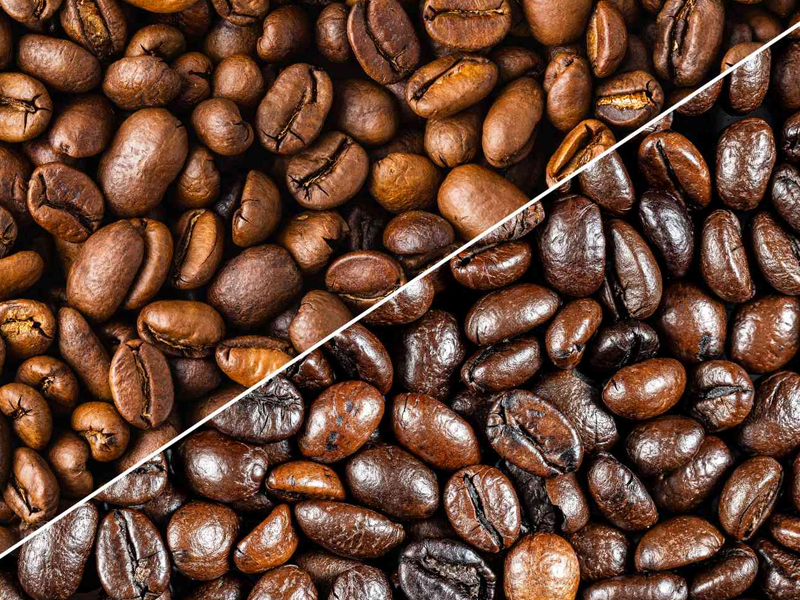There are two main types of coffee beans, Arabica and Robusta, each with its own characteristics. By now, most coffee drinkers have developed a preference for the taste of a particular brand or coffee type. This article is written to help coffee drinkers better understand the taste differences between Robusta and Arabica coffee and the blends thereof.
It all begins with the type of coffee beans used, most experts will tell you that arabica beans make the best coffee and many people are influenced by these expert opinions, however, while it is true that Arabica beans produce a sweet and smooth drink, Robusta beans have their own pleasantries.
Getting to know the characteristics of each coffee cherry will help you understand the pros and cons of each and how both bean varieties have a particularly important place in determining the flavour and strength of the end product. It is not always a situation of Arabica vs Robusta, but a correct combination of both can enhance the coffee drinking experience. This is where the coffee roasters’ expertise comes into play, they blend the different beans to achieve the required balance between flavour and strength
What Is The Best Coffee Beans? Arabica vs Robusta
Arabica Coffee Beans
It is the first type of bean discovered, traced back to Ethiopia in the 15th century. But it only gained popularity when it was spread around Arabia, via Yemen. This location, where people started to drink it as a stimulant, gave the plant the name Coffea Arabica.
In the second half of the 17th century, the habit of drinking coffee began to grow worldwide, and other places such as Brazil, Colombia, and Guatemala started to cultivate this plant.
To thrive, arabica’s tree requires higher altitudes (1000 – 2000m) and a moderate climate between 15-25 oC. It takes nine months for the flower to ripen into the coffee cherry. When ready to harvest, it yields 1500-3000 hectares of beans.
Arabica’s Taste
The high-quality arabica tastes sweet and smooth, with floral and fruity notes and a pleasant aroma resembling berries. It is the favourite bean for most coffee lovers and the higher percentage of world production, 60-70%.
Robusta Coffee Beans
It originated in Central and West Africa, but countries such as Vietnam, Indonesia, Thailand, and India nowadays cultivate it. The plant, named Coffea Canephora, grows well in low altitudes, with hot and humid equatorial climates.
The plantation is less susceptible to diseases, facilitating the production in large amounts, between 2300-4000 hectares when ready, which contributes to it being cheaper.
It takes longer than the arabica to mature, 10-11 months, although the time of pruning and fertilising is usually shorter than the Arabica bean type.
Robusta when compared to Arabica is often seen as an inferior product, however, it should not be a matter of being better or worse since these two coffee cherries produce drinks with different tastes to suit individual palates.
Robusta’s Taste
It has a higher percentage of caffeine, with a more pungent and bitter taste, which can vary according to the roasting and brewing process.
In general, Robusta coffee pleases those who like a full-bodied espresso with a strong taste of caffeine. Moreover, it is widely used in blends of coffee for drinks such as cappuccinos and lattes to preserve the caffeine taste that the milk could underwhelm.
Perfect Balance in Coffee Blends With Two Main Types of Coffee Beans
A 100% arabica coffee bean will indeed produce a smooth and sweet cup of coffee, while the Robusta beans will give a full-bodied espresso, but sometimes a well-balanced blend of coffee, with a perfect mix can offer the best cup of coffee.
A 60% arabica with 40% Robusta offers smoothness and sweetness while maintaining a caffeine taste. In comparison, a mix of 70% Robusta and 30% arabica will produce a strong drink with subtle hints of fruit and spices.
We’ve shared our tips to find the best cup of coffee split into three articles about coffee beans, transport and packaging and preparation method. Although personal taste has much to account for when it comes to coffee, knowing exactly what you are looking for will help you enjoy it even more.



